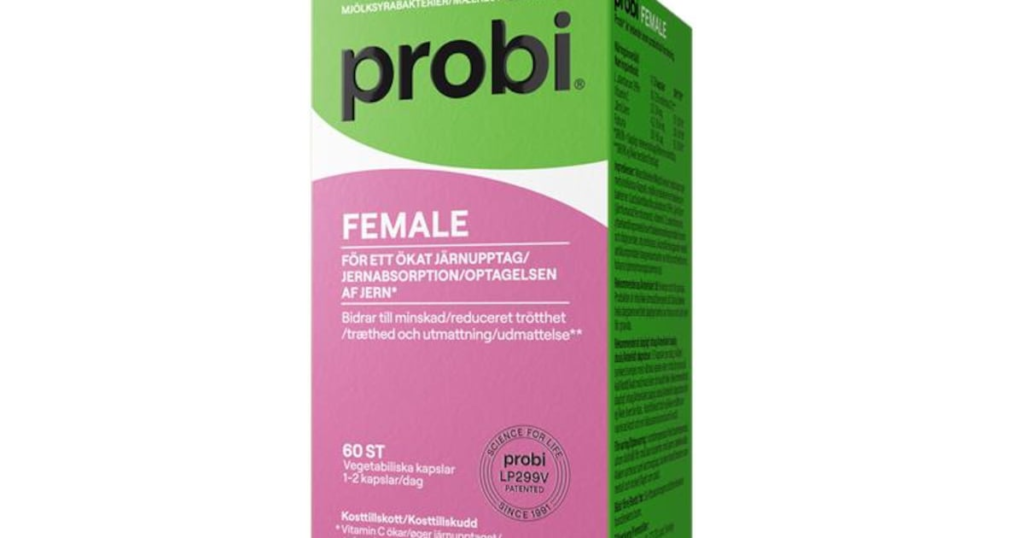The company’s latest accolade for Lactiplantibacillus plantarum 299v (LP299V) and iron under the category of Innovation in Women’s Health was announced at the 2025 NutraIngredients-Asia Award ceremony held in Bangkok on September 17.
According to Amy Lau, marketing manager for Probi’s APAC market, iron deficiency is a serious issue, particularly among women, in the region.
In South East Asia alone, the prevalence rate is estimated to be about 259m women, and nearly half of the adolescent girl population are affected.
Iron deficiency is mainly caused by menstruation, pregnancy, and insufficient dietary intake of the nutrient, with a key challenge of existing interventions being low absorption rate.
“If we consume iron or any kind of diet that contains iron, we usually absorb about 5% to 20% of the iron. Even if we are prescribed a very high iron dosage, we still only absorb a maximum of 20%—for example, for a dose of 100mg, about 80mg of that iron travels down to the lower part of the large intestine ultimately. There, it causes a lot of side effects” Caroline Montelius, department manager for Scientific Affairs at Probi, told NutraIngredients.
“It has a negative impact on the microbiome, you’d feel abdominal pain, you’d have constipation, and you may have flatulence.”
To overcome these problems, LP299V is targeted at increasing iron absorption.
“First off, the L. plantarum strain is prevalent in the upper part of the small intestine, which is the most important part because iron is absorbed from here. Secondly, L. plantarum produces lactic acid, which decreases the pH. With a lower pH in the intestinal lumen, more iron stays bioavailable, meaning we can absorb more iron from our diet.
“The third mechanism is that L. plantarum binds directly to intestinal cells that line the intestinal wall. When it binds in, it upregulates an enzyme called Duodenal cytochrome b (Dcytb) that is responsible for making iron from our diet or from a supplement more bioavailable,” Montelius explained.
Lau and Montelius believe that the NI awards, which represent “good recognition” from the industry, would help drive awareness and steer campaigns about the wider benefits of probiotics among both its partners and consumers.
“Education is really needed to help consumers understand that everything starts in the gut, and it has so many implications all over our body—iron is just one of them. With this award, I think we are opening many doors. We’re just one player. We need suitable partnerships in the industry to have better outreach and coverage.”
Big room for innovation
Montelius sees various openings for innovation, including addressing iron deficiency across different stages of a woman’s life.
“One of the most important stages is during pregnancy, where women will need more iron support. Conventional drugs cause side effects, which implies that a lot of pregnant women stop consuming them, and that is really not good for themselves and their babies. That’s one area where we see [room for innovation].
“Within the women’s health category and biotics space, we are also seeing more and more innovations driven by consumer awareness. From adolescence to the fertile and menopausal ages, different hormonal changes—with iron being a part of it—that affect women all start in the gut, where probiotics can really help.”
In addition, Montelius named bone health as an up-and-coming category, as the microbiome impacts the bone remodeling process, which is critical during perimenopause when estrogen levels drop.
“With more inflammation that starts in the gut, there will be more bone loss. Probiotics can help decrease this bone loss, so this is one area where we are definitely focusing and driving more innovation in.
“The genital area, such as having a good stable microbiome in the vagina and decreasing urinary tract infection (UTI), is another area of interest.”
Other innovation opportunities cited by Montelius include continuous improvement of probiotics for immune health, mental health support through the gut-brain axis, and metabolic health targeting cholesterol levels.
For instance, the increased use of GLP-1 agonists has led to many cases of nutrient malabsorption. Furthermore, as many people over the world consume proton pump inhibitors (PPIs)—a class of medications that reduce stomach acid production to treat conditions like acid reflux and heartburn—this also causes a very low absorption rate of iron.
These are situations where an increased iron absorption can be important.
Market needs
From the consumer’s perspective, Lau said that many people are looking to improve their mental health, especially products to help them sleep better and manage stress levels.
At the same time, metabolic health is a category where consumer needs are growing.
“Consumers are looking for a healthier lifestyle and healthier biomarkers on their blood test reports, so it’s very important for us to have a solution that can help them improve their cholesterol and insulin levels, which are critical for metabolic syndrome.”
Montelius added that these aspects are all part of women’s health, a particularly big category that consolidates various health functions, as well as longevity, as people today seek not just to live longer, but also healthier for a longer time.

